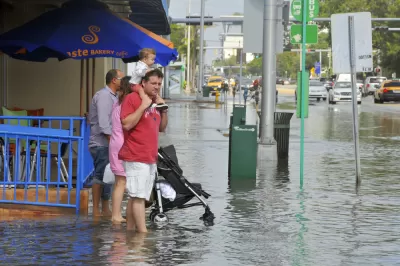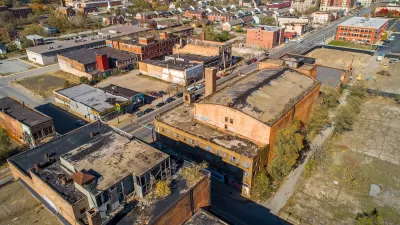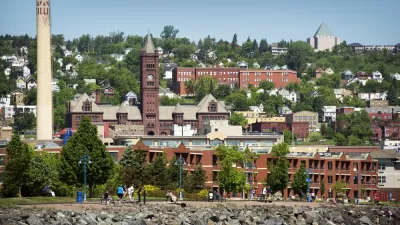More Americans are ignoring the realities of climate change emigrating—even as more and more climate refugees flee the damage.

[Updated September 1, 2021] Lily Katz and Sebastian Sandoval-Olascoaga share insight from a recent analysis by Redfin that finds Americans moving toward the devastation of climate change.
Among the key findings of the analysis, which uses data from the climate-data startup ClimateCheck to calculate climate risk: "The U.S. counties with the largest share of homes facing high heat, drought, fire, flood and storm risk saw their populations grow from 2016-2020 due to migration."
The report further describes that population growth as the result of positive net migration.
It's possible that in some cases, the heat in those fast-growing cities could be part of the reason housing prices are low.
The analysis also finds that the least risky locations, from a climate change standpoint, are experiencing population decline.
The 50 U.S. counties with the largest share of homes facing high heat risk saw their populations increase by an average of 4.7% from 2016 through 2020 due to positive net migration. Meanwhile, the 50 counties with the largest percentage of homes facing high drought, fire, flood and storm risk experienced average population growth of 3.5%, 3%, 1.9% and 0.4%, respectively, due to positive net migration.
Only the 50 counties facing increased storm risks grew during the same period—at a rate of 0.9 percent.
These large trends in migration are happening despite the nation's first climate refugees are already on the move at large scales. A paper published in September 2020 completed the largest ever mapping project to plot the high- and low-risk locations in the country in a future defined by climate change.
FULL STORY: More People Are Moving In Than Out of Areas Facing High Risk From Climate Change

Maui's Vacation Rental Debate Turns Ugly
Verbal attacks, misinformation campaigns and fistfights plague a high-stakes debate to convert thousands of vacation rentals into long-term housing.

Planetizen Federal Action Tracker
A weekly monitor of how Trump’s orders and actions are impacting planners and planning in America.

In Urban Planning, AI Prompting Could be the New Design Thinking
Creativity has long been key to great urban design. What if we see AI as our new creative partner?

King County Supportive Housing Program Offers Hope for Unhoused Residents
The county is taking a ‘Housing First’ approach that prioritizes getting people into housing, then offering wraparound supportive services.

Researchers Use AI to Get Clearer Picture of US Housing
Analysts are using artificial intelligence to supercharge their research by allowing them to comb through data faster. Though these AI tools can be error prone, they save time and housing researchers are optimistic about the future.

Making Shared Micromobility More Inclusive
Cities and shared mobility system operators can do more to include people with disabilities in planning and operations, per a new report.
Urban Design for Planners 1: Software Tools
This six-course series explores essential urban design concepts using open source software and equips planners with the tools they need to participate fully in the urban design process.
Planning for Universal Design
Learn the tools for implementing Universal Design in planning regulations.
planning NEXT
Appalachian Highlands Housing Partners
Mpact (founded as Rail~Volution)
City of Camden Redevelopment Agency
City of Astoria
City of Portland
City of Laramie





























